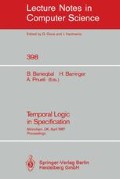Abstract
We propose a new paradigm in executable logic, that of the declarative past and imperative future. A future statement of temporal logic can be understood in two ways: the declarative way, that of describing the future as a temporal extension; and the imperative way, that of making sure that the future will happen the way we want it. Since the future has not yet happened, we have a language which can be both declarative and imperative. We regard our theme as a natural meeting between the imperative and declarative paradigms.
More specifically, we describe a temporal logic with Since, Until and fixed point operators. The logic is based on the natural numbers as the flow of time and can be used for the specification and control of process behaviour in time. A specification formula of this logic can be automatically re-written into an executable form. In an executable form it can be used as a program for controlling process behaviour. The executable form has the structure “If A holds in the past then do B”. This structure shows that declarative and imperative programming can be integrated in a natural way.
This research was supported by the Science and Engineering Research Council under grant GR/D/5939.7 as part of the ALVEY project “Pure Logic Language” IKBS/170, and by the National Science Foundation under grant IST-8505586. I would like to thank Ian Hodkinson and Richard Owens for carefully reading the draft, making many suggestions and helping with the preparation of this paper. Any errors, naturally, remain the responsibility of the author.
Preview
Unable to display preview. Download preview PDF.
References
H. Barringer, M.D. Fisher, D.M. Gabbay, G. Gough and R.P. Owens MetateM: A Framework for Programming in Temporal Logic (draft report), 1988
J. Darlington and L. While Controlling the Behaviour of Functional Programs Third Conference on Functional Programming Languages and Computer Architecture, 1987
D.M. Gabbay “Modal and Temporal Logic Programming” in Temporal Logics and their Applications edited by A. Galton, Academic Press, 1987
M.D. Fisher Implementing a Prototype MetateM Interpreter (preliminary internal report) Department of Computer Science, University of Manchester, 1988
I. Hodkinson Decidability and elimination of fixpoint operators in the temporal logic USF preprint, Department of Computing, Imperial College, London SW7 2BZ, 1989
J.A.W. Kamp Tense Logic and the Theory of Linear Order, PhD thesis, University of California, Los Angeles, 1968
R.P. Owens USF and MetateM Prototype Interpreters, (preliminary internal report), Department of Computing, Imperial College, London SW7 2BZ, 1989
Author information
Authors and Affiliations
Editor information
Rights and permissions
Copyright information
© 1989 Springer-Verlag Berlin Heidelberg
About this paper
Cite this paper
Gabbay, D. (1989). The declarative past and imperative future. In: Banieqbal, B., Barringer, H., Pnueli, A. (eds) Temporal Logic in Specification. Lecture Notes in Computer Science, vol 398. Springer, Berlin, Heidelberg. https://doi.org/10.1007/3-540-51803-7_36
Download citation
DOI: https://doi.org/10.1007/3-540-51803-7_36
Published:
Publisher Name: Springer, Berlin, Heidelberg
Print ISBN: 978-3-540-51803-7
Online ISBN: 978-3-540-46811-0
eBook Packages: Springer Book Archive

